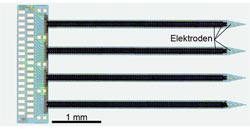New Probes for the Brain

Example of a neural probe with 752 microelectrodes distributed on four-millimeter-long shafts, like those developed in the project NeuroProbes: The scientists collaborating on the new research project NeuroSeeker want to build on this work./IMTEK<br>
Developing tiny probes for research and brain-related medical applications – that is the goal of the project NeuroSeeker, launched in February 2013 with a kick-off event in Leuven, Belgium.
The interdisciplinary project pools the expertise of ten partner institutions from Europe and Canada. The University of Freiburg will receive around 1.7 million euros from the European Union (EU) in the coming four years for its contribution. The project coordinator is Dr. Patrick Ruther, who works under Prof. Dr. Oliver Paul at the Microsystems Materials Laboratory of the University of Freiburg’s Department of Microsystems Engineering (IMTEK).
NeuroSeeker is an extension of the successful EU project NeuroProbes, which was completed at the end of the year 2010. The scientists are developing new probes for recording neural signals and stimulating optical tissue. In order to attain a fundamental understanding of the brain, it is essential to derive signals directly from its basic building blocks, the neurons.
The probes will thus be designed to measure and analyze the signals of individual nerve cells and their connections, and if necessary to optically or electrically stimulate nervous tissue. They will serve as instruments for basic neuroscientific research as well as for medical applications, for instance in the diagnosis of epilepsy. The partner institutions are the research center Imec in Leuven, Belgium; the University of Parma, Italy; the Dutch universities Amsterdam and Nijmegen; and the University of Lethbridge, Canada.
Other institutions contributing their expertise to the project are the Fundação Champalimaud from Portugal, the Max Planck Society from Germany, the Hungarian Academy of Science, and the joint IMTEK-Imec spin-off ATLAS Neuroengineering from Belgium. NeuroSeeker will support the new Cluster of Excellence BrainLinks-BrainTools of the University of Freiburg with its competence in neurotechnology and brain-machine interfaces.
Contact:
Dr. Patrick Ruther
Microsystems Materials Laboratory
Department of Microsystems Engineering – IMTEK
University of Freiburg
Phone: +49 (0)761 / 203-7197
E-Mail: ruther@imtek.de
Katrin Grötzinger
Communication & Marketing
Department of Microsystems Engineering – IMTEK
University of Freiburg
Phone: +49 (0)761 / 203-73242
E-Mail: katrin.groetzinger@imtek.uni-freiburg.de
Media Contact
More Information:
http://www.uni-freiburg.deAll latest news from the category: Information Technology
Here you can find a summary of innovations in the fields of information and data processing and up-to-date developments on IT equipment and hardware.
This area covers topics such as IT services, IT architectures, IT management and telecommunications.
Newest articles

A universal framework for spatial biology
SpatialData is a freely accessible tool to unify and integrate data from different omics technologies accounting for spatial information, which can provide holistic insights into health and disease. Biological processes…

How complex biological processes arise
A $20 million grant from the U.S. National Science Foundation (NSF) will support the establishment and operation of the National Synthesis Center for Emergence in the Molecular and Cellular Sciences (NCEMS) at…

Airborne single-photon lidar system achieves high-resolution 3D imaging
Compact, low-power system opens doors for photon-efficient drone and satellite-based environmental monitoring and mapping. Researchers have developed a compact and lightweight single-photon airborne lidar system that can acquire high-resolution 3D…





















